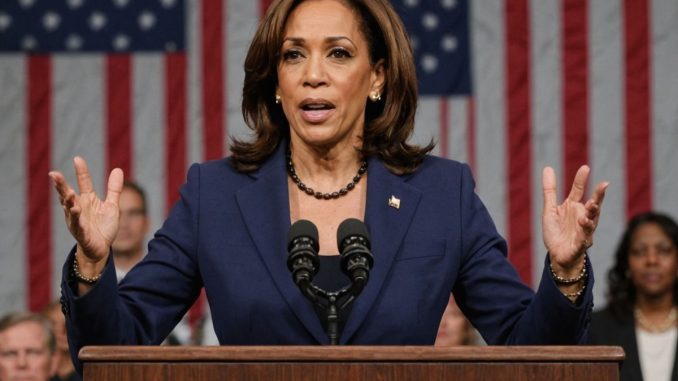
In a significant policy shift, Vice President Kamala Harris has proposed a 28% capital gains tax rate for high earners, diverging from President Joe Biden’s more aggressive tax plan. This move comes as the 2024 presidential election campaign heats up, with economic policies taking center stage.
Key Takeaways
- Kamala Harris proposes a 28% capital gains tax rate for those earning over a million dollars annually.
- This rate is lower than President Biden’s proposed nearly 40% rate.
- The proposal aims to balance revenue generation with investment incentives.
- Critics argue it could discourage investment and hamper economic growth.
Proposed Capital Gains Tax Changes
Vice President Harris has suggested a 28% rate for long-term capital gains for individuals earning a million dollars or more per year. This is an increase from the current top capital gains tax rate of 20%, but it falls short of the nearly 40% rate previously suggested by the Biden administration in its FY25 budget proposal.
“We will tax capital gains at a rate that rewards investment in America’s innovators, founders, and small businesses,” Harris stated at a campaign rally in New Hampshire.
Capital gains taxes are levied on profits from selling assets like stocks, mutual funds, and real estate. The rate depends on your taxable income and how long you’ve held the asset. Generally, capital gains tax rates are lower than federal income tax rates for ordinary income like wages.
Current Long-Term Capital Gains Tax
Long-term capital gains tax rates apply to assets held for more than a year. Currently, the rates are 0%, 15%, or 20%, depending on your income level. Essentially, the higher your income, the higher your rate. The income thresholds for long-term capital gains are adjusted annually for inflation.
Kamala Harris’ Wealth Tax
Harris’ plan for making the tax code more fair includes a so-called “Billionaire Minimum Tax,” designed to balance raising revenue and maintaining investment incentives. President Biden’s budget proposal, which Harris generally supports, includes a Billionaire Minimum Tax for households with a net worth of over $100 million. Biden’s proposed tax rate would be at least 25%, a notable increase for the wealthiest taxpayers, who reportedly pay an average tax rate of about 8.2%, according to the White House.
Proponents suggest Harris’ plan could:
- Generate additional revenue to fund social programs
- Reduce income inequality
- Preserve incentives for long-term investment and entrepreneurship
Critics, however, argue that increasing capital gains tax rates could discourage investment and potentially hamper economic growth.
Trump on Capital Gains
Meanwhile, former president and Republican presidential nominee Donald Trump has proposed a 15% reduced capital gains tax rate. This would be a significant cut from the current top rate of 20% for long-term capital gains. This proposal is part of a broader conservative tax agenda that some say would shift U.S. tax policy towards a consumption model.
Critics see this potential capital gains tax cut as primarily benefiting high-income earners since most taxpayers already pay 15% or less on their capital gains. Proponents suggest a lower capital gains tax rate could stimulate investment and economic growth.
Capital Gains Tax Rates: Bottom Line
As the 2024 November 5 election approaches, the debate over taxes will likely continue. Harris’ 28% long-term rate proposal adds another dimension to discussions that already include the TCJA tax cliff, Trump’s vow to end taxes on Social Security benefits, and both candidates’ pledge to eliminate federal tax on tips.
However, any changes to the already complicated U.S. tax code would likely face intense lobbying from groups who benefit from the current lower rates. Implementing a new capital gains tax rate or Billionaire Minimum Tax would require congressional approval, which could be challenging given the current political landscape.
If you’re worried about your tax liability, consult a trusted financial advisor or tax planner.

